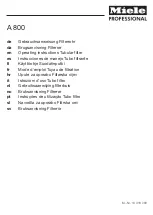
Installation Fitting Assemblies
The installation fittings connect to the control valve or the bypass valve using nuts that only require hand
tightening. Hand tighten nut connections between control valve and installation fittings, control valve and
bypass valve, and bypass valve and installation fittings allow for easy serviceability. Do not use a pipe
wrench to tighten nuts on installation fittings. Hand tighten only.
Split ring retainer design holds the nut on and allows load to be spread over the entire nut surface area
reducing the chance for leakage. The split ring design, incorporated into the installation fittings allows
approximately 2 degrees off axis alignment to the plumbing system. The installation fittings are designed
to accommodate minor plumbing misalignments but are not designed to support the weight of a system of
the plumbing.
When assembling the installation fitting package, connect the fitting to the plumbing system first and then
attach the nut, split ring and o-ring. Heat from soldering or solvent cements may damage the nut, split ring
or o-ring. Solder joints should be cool and solvent cements should be set before installing the nut, split
ring and o-ring. Avoid getting primer and solvent cement on any part of the o-rings. Split rings, bypass
valve or control valve. Solvent cements and primers should be used in accordance with the
manufacturer's instructions.
Slip the nut onto the fitting first, then the split ring second and the o-ring last.
HAND TIGHTEN THE NUT
.
If the fitting is leaking, tightening the nut will not stop the leak. Remove the nut, remove the fitting, and
check for damage or misalignment of the o-ring.
Do not use pipe dope or other sealant on threads. Teflon tape must be used on the threads of the 1" NPT
elbow and the ¼" NPT connection and on the threads for the drain line connection. Teflon tape is not
necessary on the nut connection or caps because of the o-ring seals.
Bypass Valve
See page 6 for diagram and operation layout
The bypass valve easily connects to the control valve body using nuts that only require hand tightening.
Hand tighten nut connections between control valve and fittings, control valve and bypass valve, and
bypass valve and installation fittings allow for easy serviceability. The split ring retainer design holds the
nut on and allows load to be spread over the entire nut surface area reducing the chance for leakage. The
split ring design, incorporated into the bypass, allows approximately 2 degrees off axis alignment to the
plumbing system. The bypass is designed to accommodate minor plumbing misalignments but is not
designed to support the weight of a system of the plumbing.
Avoid getting primer and solvent cements on any part of the o-rings or split rings, bypass valve or control
valve. Do not use pipe dope or other sealant on threads. Teflon tape is not necessary on the caps
because of o-rings seals.
Do not use Vaseline, oils, or other unacceptable lubricants on o-rings. A silicon lubricant may be used on
black o-rings. All seals are self-lubricating E.PPM. for long life lubricating qualities.
Note: Quick connect 1" nut will fit around a ¾ " copper elbow. (for ease of installation)
Bypass Valve Operation
5
Summary of Contents for ECONO Series
Page 6: ...6...



































